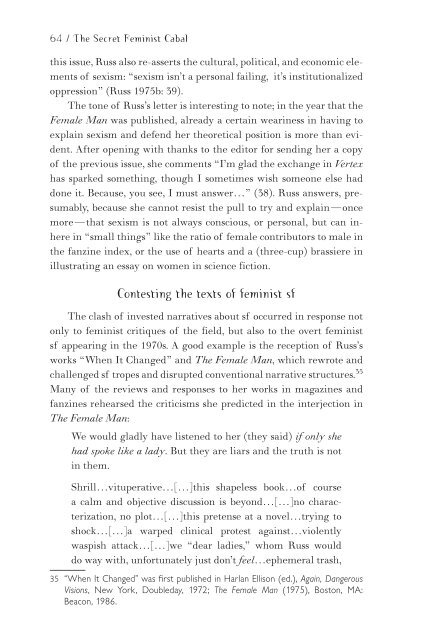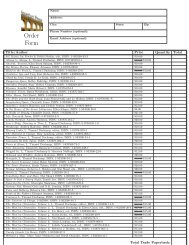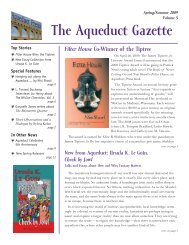Feminist Ca
Read Chapters Two and Three - Aqueduct Press
Read Chapters Two and Three - Aqueduct Press
- No tags were found...
You also want an ePaper? Increase the reach of your titles
YUMPU automatically turns print PDFs into web optimized ePapers that Google loves.
64 / The Secret <strong>Feminist</strong> <strong>Ca</strong>bal<br />
this issue, Russ also re-asserts the cultural, political, and economic elements<br />
of sexism: “sexism isn’t a personal failing, it’s institutionalized<br />
oppression” (Russ 1975b: 39).<br />
The tone of Russ’s letter is interesting to note; in the year that the<br />
Female Man was published, already a certain weariness in having to<br />
explain sexism and defend her theoretical position is more than evident.<br />
After opening with thanks to the editor for sending her a copy<br />
of the previous issue, she comments “I’m glad the exchange in Vertex<br />
has sparked something, though I sometimes wish someone else had<br />
done it. Because, you see, I must answer…” (38). Russ answers, presumably,<br />
because she cannot resist the pull to try and explain — once<br />
more — that sexism is not always conscious, or personal, but can inhere<br />
in “small things” like the ratio of female contributors to male in<br />
the fanzine index, or the use of hearts and a (three-cup) brassiere in<br />
illustrating an essay on women in science fiction.<br />
Contesting the texts of feminist sf<br />
The clash of invested narratives about sf occurred in response not<br />
only to feminist critiques of the field, but also to the overt feminist<br />
sf appearing in the 1970s. A good example is the reception of Russ’s<br />
works “When It Changed” and The Female Man, which rewrote and<br />
challenged sf tropes and disrupted conventional narrative structures. 35<br />
Many of the reviews and responses to her works in magazines and<br />
fanzines rehearsed the criticisms she predicted in the interjection in<br />
The Female Man:<br />
We would gladly have listened to her (they said) if only she<br />
had spoke like a lady. But they are liars and the truth is not<br />
in them.<br />
Shrill…vituperative…[…]this shapeless book…of course<br />
a calm and objective discussion is beyond…[…]no characterization,<br />
no plot…[…]this pretense at a novel…trying to<br />
shock…[…]a warped clinical protest against…violently<br />
waspish attack…[…]we “dear ladies,” whom Russ would<br />
do way with, unfortunately just don’t feel…ephemeral trash,<br />
35 “When It Changed” was first published in Harlan Ellison (ed.), Again, Dangerous<br />
Visions, New York, Doubleday, 1972; The Female Man (1975), Boston, MA:<br />
Beacon, 1986.




